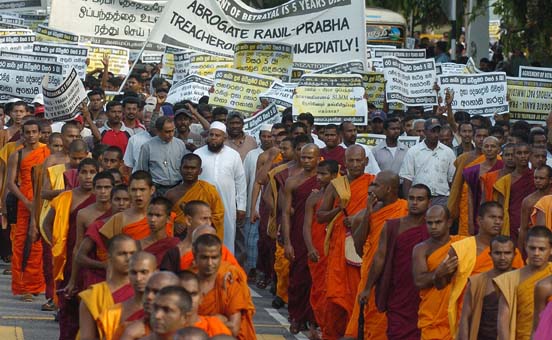Sri Lanka’s frayed ceasefire agreement between the Tamil Tigers and the government, which is five years old, may soon go the way of previous abortive agreements in the island’s conflict, amid emerging protests by Sinhalese nationalists and criticism by the President himself.
Until a cycle of killing began escalating in 2005, the 2002 truce, underpinning Norwegian mediated peace process, and had ushered in the longest period of peace since the conflict began.
 |
| Buddhist monks protested in Colombo on February 22, demanding the government scrap the 2002 truce with Tamil Tigers. The government launched fresh attacks on the anniversary of the truce. Photo: LAKRUWAN WANNIARACHCHI/AFP/Getty Images |
However, on the February 9, Sri Lanka’s hardline President Rajapakse told the BBC, that the truce was a mistake because it had legitimised the LTTE’s control of territory.
“Today we realise we have made a mistake,” President Rajapakse said of the CFA. “Through the peace pact, we have demarcated areas called LTTE-controlled areas.”
Since President Rajapakse came to power in November 2005, the Sri Lankan armed forces have launched major offensives to clear the LTTE out of the east and are now threatening to take the war to the north.
The CFA has all but collapsed after several months of bloody fighting in which government offensives capturing large swathes of LTTE territory.
In the context of President Rajapakse’s dismissal of the truce, Sinhala nationalist agitation has escalated sharply in the past few days, as the fifth anniversary approaches.
Hardline monks of the National Bikku Front started a fast-unto-death on February 11 demanding the government to withdraw from the CFA and began a prayer campaign on February 17 at the island’s main Buddhist temple, the Dalada Maligawa (or Temple of the Tooth) in Kandy.
The ultra-nationalist JVP, Sri Lanka’s third largest part, held a public meeting in Colombo on February 22 demanding an end to the truce.
They were joined by nationalist Buddhist monks in saffron robes.
"This cease-fire is a serious threat to the country's unitary status," a spokesman for the monks, told The Island newspaper.
The JVP, whose grassroots support was crucial to Rajapakse;s victory at the November 2005 Presidential elections, has condemned the CFA since its signing 2002.
The party, along with the monks’ party, the JHU, endorse President Rajapakse’s efforts to militarily destroy the LTTE.
The JVP has consistently opposed any agreement with the LTTE and has been instrumental in launching legal challenges to past agreements between Colombo and the Tigers resulting in past agreements being abandoned.
Last year the JVP filed a case for the annulment of the 1987 merger of the Northeast province.
Under the Indo-Sri Lanka Accord of that year,the two provinces were merged, recognising these were “areas of historical habitation of Sri Lankan Tamil speaking peoples.”
However last year, in response to the JVP petition, the Supreme Court declared the merger null and void.
Despite international disquiet, President Rajapakse moved swiftly to trifurcate the Northeast province, a move Tamils argue is intended to dilute their claim to a homeland in the island.
In 2005 the JVP successfully filed a case against the Post Tsunami Operational Management Structure (P-TOMS), an internationally-backed aid sharing mechanism between Colombo and the Tigers.
In the aftermath of the Boxing day tsunami which devastated the coastal areas of the island leaving tens of thousands dead and hundreds of thousands homeless, the international community pressured Sri Lanka to enter into an agreement with the LTTE on sharing aid.
Then President Chandrika Kumaratunga succumbed to pressure and signed the PTOMS, however the JVP quit her government in disgust at the deal and then challenged it in court.
For its part, LTTE has repeatedly stated its commitment to the CFA and insists only if the truce holds and is implemented can the peace process advance.
However, just as it did with the PTOMS and the NE merger, the JVP has filed another petition against the CFA in the Supreme Court.
That comes up for consideration on March 6.
Analysts say President Rajapakse’s government, under international pressure over widespread human rights violations by the security forces, will avoid incurring further international ire and not abrogate the pact formally.
Instead, the government will step up its military offensives against the LTTE.
We need your support
Sri Lanka is one of the most dangerous places in the world to be a journalist. Tamil journalists are particularly at threat, with at least 41 media workers known to have been killed by the Sri Lankan state or its paramilitaries during and after the armed conflict.
Despite the risks, our team on the ground remain committed to providing detailed and accurate reporting of developments in the Tamil homeland, across the island and around the world, as well as providing expert analysis and insight from the Tamil point of view
We need your support in keeping our journalism going. Support our work today.
For more ways to donate visit https://donate.tamilguardian.com.

